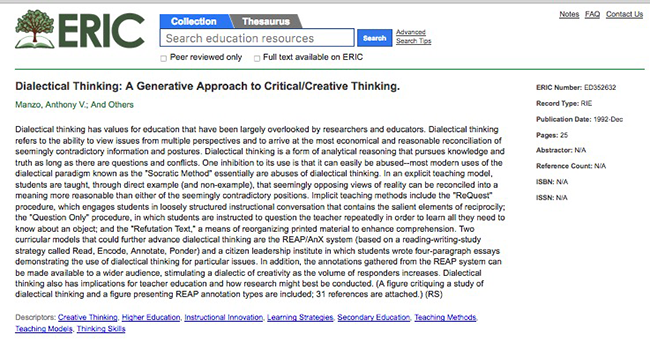Dialectical Approaches
Background: A number of problem-solving techniques apply an age-old method—dialectics.

It's the basis of modern parliaments and congresses, the foundation of the modern jurisprudence, the driving force of capitalism, the underlying process in Natural Selection, and the spiritual force attributed to concepts such as yin and yang. It encompasses the belief that new ideas and original forms eventually and naturally arise from among competing forces.
It's no wonder, then, that several dialectical approaches have been put forward as problem-solving techniques. They are listed below under "More about Dialectical Approaches."
A generalized technique, borrowing from all of them, is outlined under "How to Use Dialectics." All dialectical techniques exploit creative conflict as a way to identify and to challenge assumptions as well as to discover original approaches and solutions. All of the approaches, including the age-old models listed above, serve as inspiration for modifying they dialectical approach you choose to suit the challenge at hand.
One approach, called The Devil's Advocate, gets its name from the agent, similar to a court prosecutor, who argues against a candidate for sainthood in the canonization process of the Catholic Church.
Another, the The Wright Stuff, comes from the inventors of the airplane. Orville and Wilbur Wright practiced a dramatic version of dialectics. They would vehemently argue each side of a disputed point, then switch sides and argue just as enthusiastically for the other side. Arguing for an opponent's point of view invariably unearths new and original insight.
How to Use Dialectics
In all cases, one or more individuals present the case for a solution to a problem. In some variations, as in a debate, the opposite side argues against the proposed solution. All participants look for assumptions to challenge and for original approaches to adopt.
In the spirit of creative inquiry, it is help and often necessary for a facilitator to guide the process of debate, maintain goodwill, discourage destructive or repetitive argument, and to keep the group moving toward solutions.
To conclude a dialectical process, the facilitator encourages the group to identify new ideas and insights that have arisen and to come to a consensus about how to execute a solution or solutions.
More about Dialectical Approaches
The Devil's Advocate and Dialectical Inquiry
Read "The Wright Stuff"
ERIC
